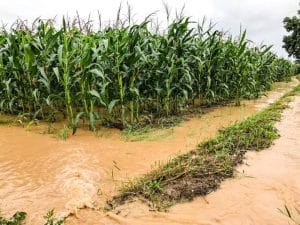
Nigeria’s escalating food crisis is being worsened by recent floods that have submerged 115,265 hectares of farmland, as reported by the National Emergency Operations Center (NEOC).
Naija News reports that this severe flooding has impacted agricultural productivity across the nation.
Among the hardest-hit states, Bauchi leads with 50,343 hectares affected, followed by Taraba with 22,182 hectares, and Jigawa with 9,919 hectares.
Other states suffering significant damage include Niger (9,488 hectares), Sokoto (8,676 hectares), and several others, ranging from Adamawa with 3,392 hectares to Zamfara with 1,584 hectares.
The NEOC’s 2024 flood report highlights the extensive damage: 29 states and 154 local government areas have been impacted, affecting 611,201 people, displacing 225,169 individuals, and damaging 83,457 households. The floods have also claimed 201 lives and resulted in 2,119 injuries.
This disaster compounds the existing food shortages in Nigeria, where food inflation has surged beyond 40%, according to the National Bureau of Statistics (NBS).
A recent survey by the Central Bank of Nigeria (CBN) projects that households will allocate a significant portion of their budgets to food, with expectations of spending 54.9% of their income on food in the coming months.
The survey, conducted between July 22 and 26, 2024, reveals that Nigerians are likely to reduce spending on non-essential items and investments, instead focusing their resources on food, education, transportation, electricity, and medical expenses.
Former CBN Deputy Governor Points to Conflict and Inflation as Key Drivers of Food Crisis
A former Deputy Governor of the CBN, Obadiah Malafia, attributes the rising food prices and inflation in Nigeria to violent clashes between herdsmen and farmers, among other factors.
Speaking on Channels Television Breakfast Programme, Sunrise Daily, Malafia explained how these conflicts have created insecurity that hampers agricultural activities and lowers productivity.
Malafia noted that these clashes have led to fears among farmers, causing them to avoid more productive, distant farmlands in favor of those closer to home.
He also pointed to high inflation and fluctuating exchange rates as significant contributors to rising food costs, impacting the prices of imported farming inputs like tractors and fertilizers.
With inflation hovering around 16%, Malafia stressed the need for effective measures to reduce it to single digits to alleviate poverty and encourage investment. He highlighted the ongoing disruption in farming activities and called for better government intervention.
Agriculture Minister Promises Bumper Harvest Despite Challenges
The Minister of Agriculture and Food Security, Abubakar Kyari, remains optimistic about the upcoming harvest. He assured the public that measures are in place to mitigate the effects of flooding and other issues affecting agriculture.
Kyari anticipates a bumper harvest around October-November 2024, provided no further natural disasters occur. He attributed the current food shortage partly to seasonal factors and emphasized the government’s efforts to enhance food production through mechanization and improved agricultural practices.
To address these challenges, Kyari revealed plans to distribute fertilizers and acquire modern farming equipment, including 200 tractors and 9,000 implements from Belarus.
He acknowledged that the shift from traditional methods to mechanized farming is crucial for improving productivity and addressing the food crisis in Nigeria.
The post Food Crisis Threatens To Escalate As Flooding Devastates 115,265 Hectares Of Farmland In Nigeria appeared first on Naija News.


